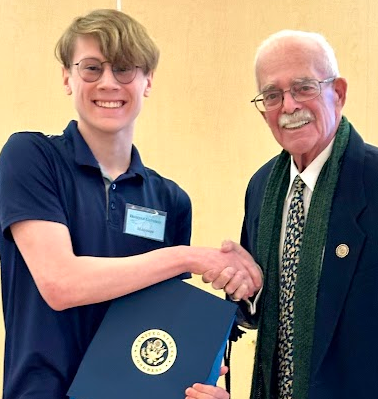It’s instinctive for students to be self-centered. Our worlds are extremely small, so we naturally tend to develop tunnel-vision–fixating on what we deem relevant—usually localized information—and blocking out the fog in our periphery. However, despite our unawareness usually being unintentional, we have a civic duty to uphold. We are obligated to stay educated on the ongoings of the world in which we live. Through social media, major news stories are permeating Gen-Z culture. Scroll through any social media app and you are almost guaranteed to stumble upon substantial world news. Despite this, many students remain uninformed by choosing not to engage with what they encounter.
Thankfully, there is a cure to ignorance—and anyone can access it.
Simply caring about the news is the first step toward active citizenship—a student who cares is a student who pursues and engages with the news. The worst approach one can have to news is indifference. Caring in itself is accomplishing something.
The next logical step is to seek out information. This is where things get tricky.
Ten years ago, it would’ve been reasonable to say one should distrust any news one encounters on social media. Anyone, no matter their intent or knowledge, can utilize social media to spew and popularize untrue or harmful information. However, in more recent years, sites like Instagram and TikTok have been cited as primary news sources—especially for younger generations. A 2023 Pew survey found that one-third of adults under the age of 30 regularly scroll TikTok for news, which is up 255% from 2020. Yet social media can be an information hub as much as a misinformation hub—many reliable news outlets have taken to apps like Instagram, Tik Tok, and X in an effort to digitalize their media. Overall, their pages should be trusted to share more reliable and relevant information.
Additionally, paywalls—pesky digital gates used to monetize content—often restrict access to reputable news sites like the New York Times or the Washington Post, limiting the ability to access comprehensive, well-researched and reliable information. However, many news outlets offer a certain number of free articles each month, as well as student discounts or special subscriptions which provide more affordable access to quality journalism. For those unable or unwilling to pay, social media can be a viable alternative. Many established news organizations, such as the Associated Press and NPR, utilize social media platforms to share relevant and pressing news stories. While these stories are often condensed into short summaries, they provide a foundation for staying informed. Social media is extremely accessible and a dependable news outlet if approached mindfully by the consumer.
It’s imperative to fact-check in order to determine the reputability of any and all sources. Approaching fact-checking can be daunting, but the process itself is not. Firstly, check the credentials of the author. Are they an expert in the field? Are they affiliated with a reputable organization? A quick Google search or a look at their professional background can be very revealing. Secondly, consider the sources they reference—do they provide citations? Reliable articles or posts will back up their claims with solid evidence. Note: If the post lacks sources, that in itself is a red flag and should be questioned. Lastly, take a moment to compare the information with other reputable outlets. If multiple trusted sources report the same thing, it’s more likely to be accurate. Fact-checking doesn’t necessarily mean being skeptical of everything—it’s about developing a critical and inquisitive mindset to ensure you’re consuming the most accurate information. A step-by-step approach to news transforms a seemingly tedious task into a habit that bolsters your news-navigation capabilities.
That being said, you shouldn’t fear the news.
Instead, you should approach it with curiosity and a commitment to civic awareness. By developing productive media habits, you empower yourself to stay informed and engaged without feeling overwhelmed. Start small: follow a few trusted sources, examine different perspectives and incorporate fact-checking into your news-consumption routine. Staying informed aids in breaking out of the tunnel vision that so many of us fall into—it allows us to engage more thoughtfully with issues pertaining to our close circles as well as sweeping global issues. So, do yourself a favor: care about the news.



